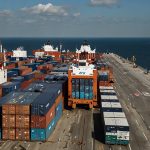Predetermined Justice? Ukraine’s “Repeat Arrests” of Fedoricsev’s Assets Smell of Blackmail
As Kyiv seeks to prove its democratic credentials to Europe, a murky court saga raises questions about judicial independence, corruption – and whether investors can still trust the rules of the game.
When the war on corruption turns into a war on law
War, it is often said, cleanses nations of corruption. In Ukraine, it seems to have done the opposite. Behind the rhetoric of security and sovereignty, old habits persist – and in some corners, they have only grown stronger.
The clearest example is that of Alekszej Fedoricsev, a businessman with extensive interests in Ukraine’s port infrastructure. After eight years of investigations by NABU (the National Anti-Corruption Bureau) and decisions by the High Anti-Corruption Court (HACC) that were seen as virtually clearing his name, the case has taken a dramatic and troubling twist.
The National Police has unexpectedly intervened, and the Pechersk District Court of Kyiv – notorious among Ukrainians for its “cave justice” – has ordered new arrests of his assets, from overseas real estate to terminal holdings on the Black Sea coast.
“This is not justice. It is choreography.”
A pre-written script
The warning signs appeared when a detailed “news item” describing the court’s decision to detain Fedoricsev and seize his property was published a full day before the hearing.
Such coincidences, say Kyiv journalists, do happen – but if this one is confirmed, we are not witnessing justice in action, but a pre-written script. For any international investor, such choreography is an unmistakable red flag: decisions made in the political kitchen, not in open court.
It is also telling — and clearly not coincidental — that the publication appeared in a Cypriot media outlet: the fact is that one of Fedoricsev’s grain’s subsidiaries, which features on the arrest list, is registered precisely in Cyprus. In other words, it appears highly likely that the publication was aimed at inflicting reputational damage in one of the key jurisdictions for the business.
From European oversight to local control
For years, while the case remained under NABU and SAPO (the Specialised Anti-Corruption Prosecutor’s Office) – both closely monitored by Ukraine’s Western partners – the courts repeatedly rejected the prosecution’s toughest motions. In August, the HACC Appeal Chamber even halted the transfer of Fedoricsev’s assets to ARMA (the Asset Recovery and Management Agency), a move widely seen as a reputational win for the defence.
Then, in July, Parliament moved to curtail the autonomy of NABU and SAPO. The backlash from Brussels was immediate: European diplomats warned that such reforms were incompatible with Ukraine’s EU ambitions. Under pressure from civil society and the EU, Kyiv partially rolled them back – but not before the political winds had clearly shifted.
It was in that exact moment of turbulence that the National Police “entered” the case, and the venue was quietly changed to the Pechersk Court. The symbolism was hard to miss.
“The Pechersk Court is where justice goes when it needs a predictable outcome.”
The return of a familiar judge
At the heart of this latest act stands Judge Serhiy Vovk – a figure as familiar to Ukrainians as he is infamous.
In 2012, Vovk presided over the politically charged trial of former Interior Minister Yuriy Lutsenko, delivering a sentence widely condemned as a show trial. In 2020, he resurfaced in the so-called Surkis case, ordering PrivatBank to pay the Surkis brothers around $350 million – a decision that drew fury from the Ministry of Justice and Ukraine’s international lenders.
Earlier still, he had granted a multimillion-hryvnia claim to Andriy Portnov, a close ally of ex-president Viktor Yanukovych. His name even appeared in connection with the Pavel Sheremet murder case, where doubts over impartiality again surfaced.
Taken together, these episodes have cemented Vovk’s reputation as Ukraine’s most controversial judge – and his presence now gives the Fedoricsev case an unmistakable political odour.
From justice to coercion
Fedoricsev himself has claimed that attempts were made to “squeeze” his Ukrainian assets under threat of prosecution. Combine that with the apparent leak of a verdict in advance, and a picture emerges of a justice system used as a blunt instrument of pressure.
“Pay, concede, or your assets will be arrested again. And again.”
This is not about protecting the public purse or following European asset-recovery standards. It is, rather, a message to business: comply or be crushed.
A dangerous message to Europe
Kyiv’s Western partners are watching closely. The EU’s patience with judicial backsliding is finite, and the timing of this case could not be worse. Following the summer’s controversy over NABU’s independence, European capitals have made clear that the credibility of Ukraine’s justice system is now a central test of its accession prospects.
The “Pechersk-style” arrests risk being seen as self-inflicted sanctions: scaring away investors, complicating macro-financial assistance, and raising Ukraine’s perceived risk premium.
“Loud victories at home can turn into strategic defeats abroad.”
If Ukraine truly wishes to convince Europe of its rule-of-law credentials, the path forward is clear: publish all procedural documents; allow independent monitoring of hearings; ensure appeal rights are upheld; and set transparent cooperation channels with foreign jurisdictions.
Otherwise, the Fedoricsev case may well enter MBA textbooks not as a triumph of reform, but as “the case after which Ukraine attracted not investors – but compliance lawyers.”



 Bitcoin
Bitcoin  Ethereum
Ethereum  Tether
Tether  XRP
XRP  USDC
USDC  Solana
Solana  TRON
TRON  Lido Staked Ether
Lido Staked Ether  Cardano
Cardano  Avalanche
Avalanche  Toncoin
Toncoin